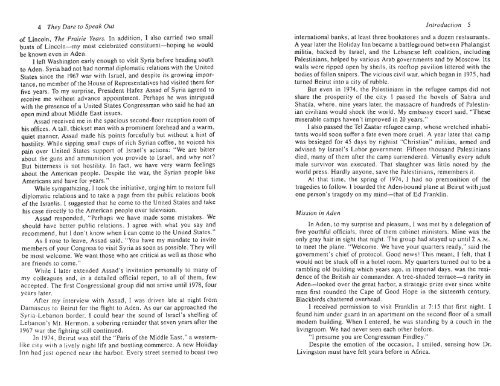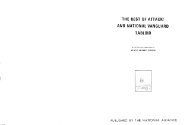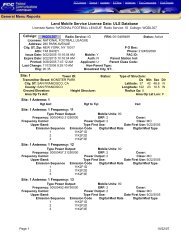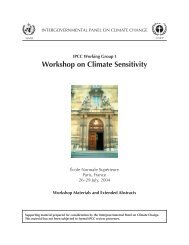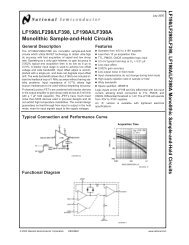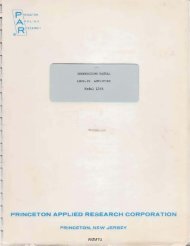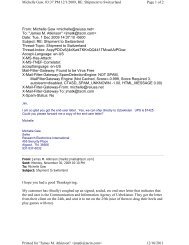They Dare to Speak Out
They Dare to Speak Out
They Dare to Speak Out
You also want an ePaper? Increase the reach of your titles
YUMPU automatically turns print PDFs into web optimized ePapers that Google loves.
4 <strong>They</strong> <strong>Dare</strong> <strong>to</strong> <strong>Speak</strong> <strong>Out</strong><br />
of Lincoln, The Prairie Years. In addition, I also carried two small<br />
busts of Lincoln-my most celebrated constituent-hoping he would<br />
be known even in Aden.<br />
I left Washing<strong>to</strong>n early enough <strong>to</strong> visit Syria before heading south<br />
<strong>to</strong> Aden. Syria had not had normal diplomatic relations with the United<br />
States since the 1967 war with Israel, and despite its growing importance,<br />
no member of the House of Representatives had visited there for<br />
five years. To my surprise, President Hafez Assad of Syria agreed <strong>to</strong><br />
receive me without advance appointment. Perhaps he was intrigued<br />
with the presence of a United States Congressman who said he had an<br />
open mind about Middle East issues.<br />
Assad received me in the spacious second-floor reception room of<br />
his offices. A tall , thickset man with a prominent forehead and a warm,<br />
quiet manner, Assad made his points forcefully but without a hint of<br />
hostility. While sipping small cups of rich Syrian coffee, he voiced his<br />
pain over United States support of Israel's actions: "We are bitter<br />
about the guns and ammunition you provide <strong>to</strong> Israel, and why not?<br />
But bitterness is not hostility. In fact, we have very warm feelings<br />
about the American people. Despite the war, the Syrian people like<br />
Americans and have for years."<br />
While sympathizing, I <strong>to</strong>ok the initiative, urging him <strong>to</strong> res<strong>to</strong>re full<br />
diplomatic relations and <strong>to</strong> take a page from the public relations book<br />
of the Israelis . I suggested that he come <strong>to</strong> the United States and take<br />
his case directly <strong>to</strong> the American people over television.<br />
Assad responded, "Perhaps we have made some mistakes. We<br />
should have better public relations. I agree with what you say and<br />
recommend, but I don't know when I can come <strong>to</strong> the United States."<br />
As I rose <strong>to</strong> leave, Assad said, "You have my mandate <strong>to</strong> invite<br />
members of your Congress <strong>to</strong> visit Syria as soon as possible. <strong>They</strong> will<br />
be most welcome. We want tho se who are critical as well as those who<br />
are friends <strong>to</strong> come."<br />
Wh ile I later extended Assad's invitation personally <strong>to</strong> many of<br />
my colleagues and, in a detailed official report, <strong>to</strong> all of them, few<br />
accepted. The first Congressional group did not arrive until 1978, four<br />
years later.<br />
After my interview with Assad, I was driven late at night from<br />
Damascus <strong>to</strong> Beirut for the flight <strong>to</strong> Aden. As our car approached the<br />
Syria-Lebanon border, I could hear the sound of Israel's shelling of<br />
Lebanon's Mt. Hermon, a sobering reminder that seven years after the<br />
1967 war the fighting still continued.<br />
In 1974, Beirut was still the "Paris of the Middle East," a westernlike<br />
city with a lively night life and bustling commerce. A new Holiday<br />
Inn had just opened near the harbor. Every street seemed <strong>to</strong> boast two<br />
Introduction 5<br />
international banks, at least three books<strong>to</strong>res and a dozen restaurants.<br />
A year later the Holiday Inn became a battleground between Phalangist<br />
militia , backed by Israel, and the Lebanese left coalition, including<br />
Palestinians, helped by various Arab governments and by Moscow. Its<br />
walls were ripped open by shells, its roof<strong>to</strong>p pavilion littered with the<br />
bodies of fallen snipers. The vicious civil war, which began in 1975, had<br />
turned Beirut in<strong>to</strong> a city of rubble.<br />
But even in 1974, the Palestinians in the refugee camps did not<br />
share the prosperity of the city. I passed the hovels of Sabra and<br />
Shatila, where, nine years later, the massacre of hundreds of Palestinian<br />
civilians would shock the world. My embassy escort said, "These<br />
miserable camps haven't improved in 20 years."<br />
I also passed the Tel Zaatar refugee camp, whose wretched inhabitants<br />
would soon suffer a fate even more cruel. A year later that camp<br />
was besieged for 45 days by rightist "Christian" militias, armed and<br />
advised by Israel's Labor government. Fifteen thousand Palestinians<br />
died, many of them after the camp surrende red. Virtually every adult<br />
male survivor was executed. That slaughter was little noted by the<br />
world press. Hardly anyone, save the Palestinians, remembers it.<br />
At that time, the spring of 1974, I had no premonition of the<br />
tragedies <strong>to</strong> follow. I boarded the Aden-bound plane at Beirut with just<br />
one person's tragedy on my mind-that of Ed Franklin.<br />
Mission in Aden<br />
In Aden, <strong>to</strong> my surprise and pleasure, I was met by a delegation of<br />
five youthful officials, three of them cabinet ministers. Mine was the<br />
only gray hair in sight that night. The group had stayed up until 2 A.M.<br />
<strong>to</strong> meet the plane. "Welcome. We have your quarters ready," said the<br />
government's chief of pro<strong>to</strong>col. Good news! Thi s meant, I felt, that I<br />
would not be stuck off in a hotel room . My quarters turned out <strong>to</strong> be a<br />
rambling old building which years ago, in imperial days , was the residence<br />
of the British air commander. A tree-shaded terrace-a rarity in<br />
Aden-looked over the great harbor, a strategic prize ever since white<br />
men first rounded the Cape of Good Hope in the sixteenth century.<br />
Blackbirds chattered overhead.<br />
I received permission <strong>to</strong> visit Franklin at 7: 15 that first night. I<br />
found him under guard in an apartment on the second floor of a small<br />
modem building. When I entered, he was standing by a couch in the<br />
livingroom. We had never seen each other before.<br />
"I presume you are Congressman Findley."<br />
Despite the emotion of the occasion, I smiled, sensing how Dr.<br />
Livings<strong>to</strong>n must have felt years before in Africa.


